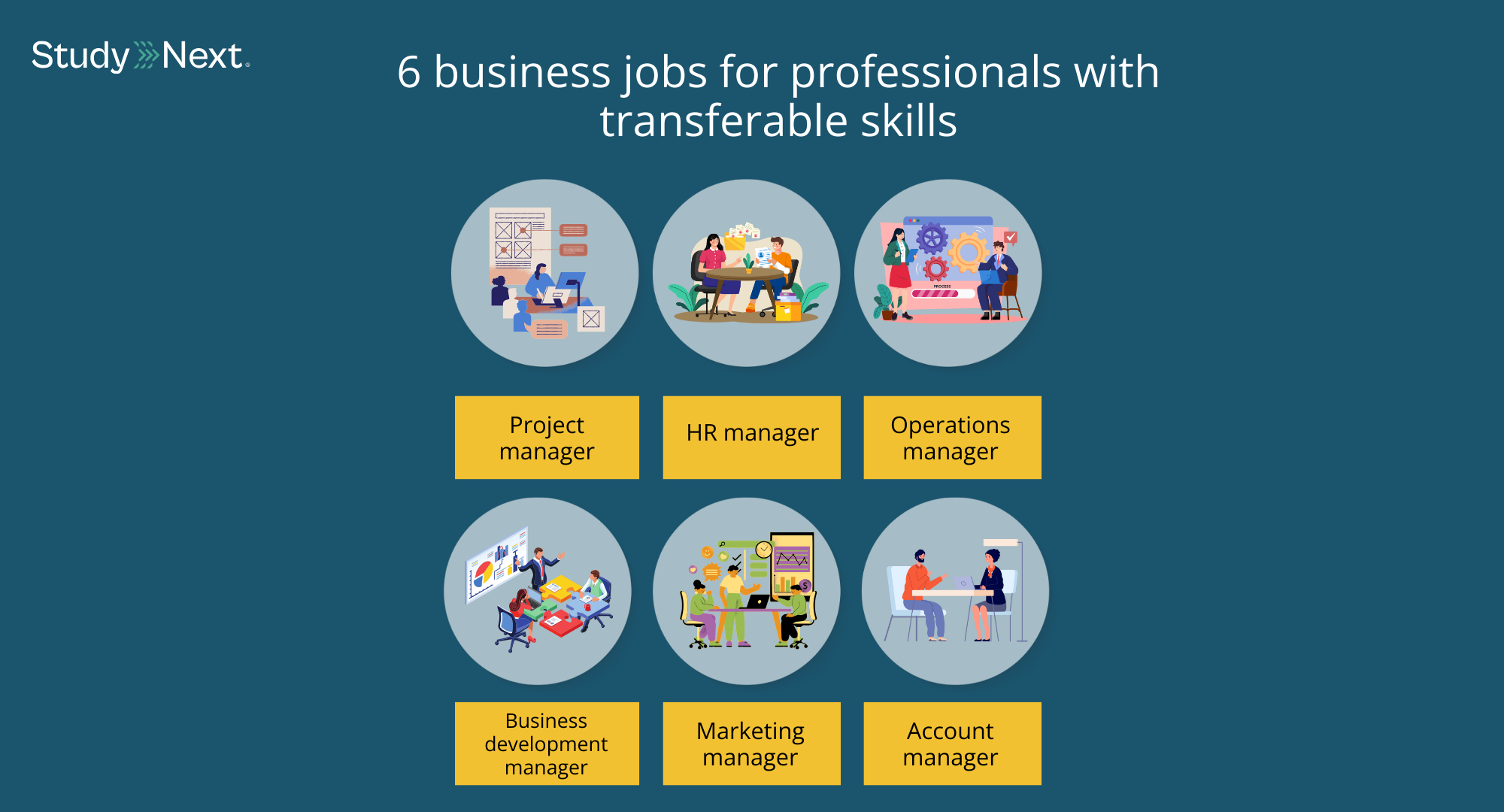
With Australia’s job market becoming increasingly competitive, business professionals need to increase their employability by building skills that can be applied across multiple roles and industries. But what are examples of transferable skills that are highly in demand?
Read this guide to explore some of the most valuable transferable skills you should develop and why they’re important in today’s job climate. We also highlight examples of business jobs you can consider with these versatile skills.
What are transferable skills?
Transferable skills refer to a set of abilities that you can apply across various jobs and industries. They include both interpersonal strengths and technical abilities gained from past roles. You can leverage these skills to highlight your value to potential employers, especially when moving into a new field. As these skills are relevant across diverse career paths, they can help you adapt in a competitive and evolving job landscape.
Top 8 transferable skills every business professional needs
Some of the most valuable transferable skills include soft skills, such as communication, collaboration and emotional intelligence, and hard skills like digital proficiency and project management. These abilities can be applied to a broad range of roles and sectors, enabling you to stay competitive in the Australian job market.
Explore what each of these skills entails below:
Communication
Communication is one of the most valuable transferable skills because it’s essential in nearly every role and industry. Strong communication, both written and verbal, enables you to deliver information clearly, ask the right questions, read non-verbal cues and build positive professional relationships. It also helps you connect effectively with a wide range of stakeholders, such as colleagues, managers, external partners and clients.
Businesses also look for talented professionals who are great communicators. According to Deloitte Access Economics and RMIT Online’s 2024 Ready Set Upskill report, communication was the most in-demand skill listed in job advertisements for professionals in 2023 across Australia. As workplaces become more digital, the nuances of human communication can’t be replicated by automation, which makes this skill even more valuable across all sectors.
How to develop this skill?
- Practise active listening by maintaining eye contact and asking thoughtful questions
- Volunteer for projects that involve public speaking
- Proofread your writing carefully to avoid errors and ensure clarity
You can also take a short course to refine your communication abilities, such as the University of New South Wales (UNSW)’s The Authentic Communicator: Activating Presence. This in-person short course delves into a variety of communication techniques, including how to manage your nerves, utilise your body and vocal presence and customise your message to various audiences. Some of the topics covered include listening, storytelling and audience analysis.


Presence is critical for anyone who needs to engage an audience of any size, from small meetings to large presentations. It enables you to communicate confidently, engage authentically and influence your audience, taking them on the journey. It allows you to have an audience in the palm of your hand, changing how they think, feel and behave.
In completing this course you will achieve two points toward a total of twelve required to obtain AGSM's Certificate in Executive Management and Development (CEMD).
Collaboration
Working with others is typically required in most roles, regardless of sector, so it’s important to have strong collaboration skills. It involves working to achieve shared goals, whether it’s with clients, colleagues or members of other departments. Skilled collaborators adjust the way they work in various group settings to help ensure that collective efforts lead to optimal results. This can improve overall productivity and foster a positive and sustainable workplace culture.
The value of collaboration also extends to organisational performance. Asana highlighted in its 2023 The Anatomy of Work report that 78 per cent of Australian employees in collaborative organisations feel well-prepared to address business challenges. This highlights how collaboration boosts resilience, which is a critical factor in achieving long-term business success.
How to develop this skill?
- Volunteer to help team members with projects
- Be open to constructive feedback to do what’s best for the team
- Join work committees or cross-department initiatives
Leadership
The ability to lead teams and projects, make strategic decisions and improve performance is highly valued across diverse industries. Strong leadership skills also enhance your career progression, unlocking more opportunities for management and executive positions. Effective leaders know how to motivate others, delegate tasks efficiently and keep teams focused on achieving business goals.
The Ready Set Upskill report by Deloitte and RMIT found that leadership is ranked as the top skill for success in the next five years, according to both Australian employers and employees. It also revealed that employers are willing to pay a premium for leadership and business expertise. This demonstrates that businesses prioritise hiring professionals who can guide teams and move the company forward.
How to develop this skill?
- Volunteer for additional responsibility at work or within your community
- Attend leadership seminars and workshops
- Seek mentorship from an experienced leader within your industry
If you’re looking for a leadership short course, you can consider the University of Queensland’s Learning the Practice of Leadership. This face-to-face short course delves into diverse leadership practices to help develop your skills to lead. You’ll learn how competence, communication and motivation play a role in effective leadership. The course also teaches you practical skills like how to delegate tasks, coach team members and manage performance to achieve organisational goals.


One of the greatest obstacles for those aspiring to leadership positions is gaining experience that will enable them to lead successfully and demonstrate their readiness for promotion.
In this course, you will learn by doing a series of realistic and practical leadership challenges that will help you hone key skills, self-awareness and confidence to motivate others. Working alongside fellow professionals, you will engage in activities to expand your capacity to lead solutions and overcome organisational problems.
An expert course facilitator will support you with the tools, insights and activities to refine and reflect on your leadership practice.
Delivered over three days in person at UQ Brisbane City.
Problem-solving
Knowing how to navigate problems at work and develop effective solutions to overcome them makes you an asset in any workplace. It involves examining a situation, coming up with various solutions and selecting the best course of action to maximise results. Strong problem-solving skills allow you to reduce disruptions and maintain productivity in the workplace. Depending on your role, this may mean resolving client complaints, developing new offerings and identifying innovative ways to market products and services.
As organisations adapt to digitalisation and automation, problem-solving skills are becoming increasingly valuable. According to Randstad’s Employment Market Analysis and Commentary report in 2024, problem-solving skills ranked as the second most in-demand skill among Australian organisations, just below technology skills. This demonstrates how technical expertise and human problem-solving must work hand in hand for companies to stay competitive.
How to develop this skill?
- Complete activities that can keep your mind sharp
- Participate in brainstorming sessions at work
- Study real-world problem-solving examples to help you manage similar challenges that may occur in the workplace
Taking a short course that focuses on critical thinking can also develop your problem-solving skills. For example, the Enhancing Your Critical Thinking Skills short course offered by Chartered Accountants ANZ aims to help you become a better-quality thinker by providing you with the tools to examine challenges in a methodical way. You’ll learn various critical thinking techniques to help you predict the outcomes of different options, enhancing decision-making processes.


Financial professionals must employ critical thinking throughout their careers. As responsibilities grow, the need to evaluate and judge increasingly complex issues becomes paramount. Critical thinking is a skill that can be honed and this micro course aims to facilitate that development. Participants will learn about the obstacles to effective critical thinking and strategies to overcome them. The course will introduce a systematic process to enhance analytical rigour and provide tools for improving the quality of reasoning. Upon completion, participants will be equipped to approach complex issues in diverse ways, ensuring well-considered and balanced judgements.
- Become a better-quality thinker by removing barriers and preparing your mindset.
- Use a process to help you analyse complex issues in a methodical way, while weighing up competing priorities and perspective.
- Learn about a range of critical thinking tools that can help you to foresee the consequences of different options and improve the quality of your decisions.
Why choose CA ANZ?
- Trusted by thousands of professionals across Australia and New Zealand
- Courses developed by industry experts and designed for real-world application
- Flexible formats that fit around your work and life
- Provide CPD to support your professional development
- Not just for accountants and no membership required
Digital proficiency
Almost every role today requires some form of interaction with technology. With the rapid development of emerging technologies like artificial intelligence (AI), equipping yourself with strong digital skills has become more critical than ever. These skills not only complement your business expertise but also enable you to navigate digital tools and platforms effectively. Being tech-savvy helps you streamline workflows, analyse data and adapt to the latest advancements that will keep you competitive in any industry.
Building digital literacy is no longer an optional choice for many employees as it’s becoming increasingly essential in the workplace. The Australian Industry Group reported in 2024 that 52 per cent of Australian businesses have already adopted AI technologies. Similarly, Deloitte and RMIT’s The Ready Set Upskill report predicted that 95 per cent of Australia’s workforce will be impacted as critical technologies, such as generative AI, become integrated with daily tasks. The report also found that employees rank digital literacy as the third most important skill for future success. These studies demonstrate how businesses and their employees recognise its value in today’s job market.
How to develop this skill?
- Experiment with new software and applications related to your work
- Volunteer to assist with tech-related tasks
- Subscribe to tech newsletters to stay updated with the latest trends
There are plenty of short courses you can explore to gain expertise in specific digital skills, such as the Business Analytics with SQL and Python course at RMIT University. Throughout this online short course, you’ll learn how to gather, clean and present data to extract valuable insights and forecasts. The course focuses on SQL, which enables you to write queries to draw out data from databases, and Python, which is a versatile language for data analysis.


Business analytics is the process in which data is obtained, cleaned and presented by teams and organisations to drive useful predictions and insights. This course focuses on two ways businesses do this — SQL, where you will learn to write queries to extract data from a database and Python, the ubiquitous programming language that enables data analysis, manipulation and predictions.
With the opportunity to work on your own data set or with a data set provided, now’s the perfect time to roll up your sleeves and get hands-on with SQL and Python. Develop critical skills in wrangling, exploring, analysing and effectively communicating data to enhance your professional value and stand out in the competitive job market.
This course focuses on business analytics, teaching how to collect, clean and present data to generate valuable predictions and insights. The course covers SQL, enabling you to write queries to extract data from databases and Python, a versatile language for data analysis, manipulation and predictions. The course helps you develop key skills in data wrangling, analysis and communication, boosting your professional value and making you more competitive in the job market.
- Master SQL and Python for business analytics: Learn to extract, clean and analyse data using SQL queries and Python functions to generate powerful insights and predictions.
- Apply data analytics to real business problems: Work with real datasets, develop forecasting models and use data visualisation to support decision-making in a competitive business environment.
- Industry-ready flexible learning: Study 100% online, gain hands-on experience with structured query language and Python libraries and enhance your professional value with in-demand analytics skills.
Emotional intelligence
In the modern business environment where human skills are increasingly valued, having high emotional intelligence is vital in any role. No matter how strong your technical skills are, being able to understand, manage and respond to your own emotions and those of others can significantly help you thrive in the workplace and progress in your career. This skill helps you stay calm under pressure, understand different perspectives in conflict resolution and build rapport with diverse stakeholders.
According to Reward Gateway’s The Business Case for Belonging report in 2024, 60 per cent of Australian employees believe that having a culture of empathy and supportive colleagues during challenging times is essential. This highlights the importance of emotional intelligence in fostering inclusive and collaborative workplaces to enhance team dynamics and improve productivity. Professionals who demonstrate these skills consistently become highly sought after, regardless of industry.
How to develop this skill?
- Use “I” statements during conflict resolution to avoid blaming others
- Practise self-management techniques such as meditation or journaling
- Build self-awareness by reflecting on past experiences to identify areas of growth
Adaptability
As change is constant in every workplace, adaptability is a strong transferable skill as it enables you to adjust to new challenges, technologies and other changes. Employers also actively seek business professionals who can learn quickly, take on new responsibilities and maintain a positive attitude while supporting business goals.
Research also highlights the importance of this skill in Australia’s workforce. For instance, the Hays 2025 Skills report ranked adaptability and flexibility as the third most important human skills for the future, according to hiring managers. This demonstrates that having a growth mindset and a willingness to learn can help you thrive in evolving work environments.
How to develop this skill?
- Stay curious and keep a positive mindset when encountering change
- Volunteer for projects outside of your role
- Work with different people to adapt to various working styles
Project management
Project management involves planning, organising and leading tasks to achieve specific goals. Whether it’s launching a marketing campaign, coordinating an event or implementing a new system, strong project management ensures work is delivered on time, within budget and to the expected standard. Besides meeting deadlines, it also helps align teams, reduce risks and manage resources effectively, making it a highly transferable skill across industries.
This skill is recognised as valuable in both public and private sectors. The Australian Public Service Commission (APS)’s The State of the Service Report 2023-24 revealed that 88 per cent of APS agencies face critical skills shortages, with project management ranking as the third most in-demand skill. This highlights the growing need for professionals who can lead projects effectively and deliver results across a wide range of industries.
How to develop this skill?
- Utilise project management tools to organise and track tasks
- Take the initiative to lead projects at work
- Build timelines for personal and professional goals
You can also consider taking a project management short course, such as UNSW’s Project Management Excellence. This two-day program explores the full project lifecycle, from planning and initiation to execution and closure. The course also provides you with tools, frameworks and methods to handle uncertainty, adapt to stakeholder needs and collaborate across teams.


This hands-on course guides participants through the full project management lifecycle - from initiation and planning to execution, monitoring and closure - with a strong focus on developing and applying a clear project development plan. Designed for current and aspiring leaders, it equips you with adaptable tools, frameworks and practical techniques to manage uncertainty, shifting stakeholder needs and cross-functional collaboration. By the end of the course, you'll have the confidence and capability to navigate complex project environments, make informed decisions and drive initiatives to successful, measurable outcomes.
Why are transferable skills important?
Transferable skills are crucial because they help future-proof your career, boost your marketability and support adaptability to change and progress your career. These skills also allow employers to build a positive workplace culture. Learn more below:
Future-proof your career: Capabilities that are uniquely human like communication and problem-solving can make you harder to replace in the age of automation and AI.
Increase marketability: By having many transferable skills on your resume, you’ll be able to apply to various roles across sectors where these abilities are in high demand.
Adapt to change: Transferable skills like adaptability and collaboration can help you navigate evolving technologies, workplace dynamics and organisational change.
Advance your career: Building a strong set of transferable skills, especially leadership, can unlock more career opportunities that fast-track your progression into leadership and management positions.
Foster good workplace culture: Employers value business professionals with strong communication and collaboration skills, as they contribute to a positive workplace culture, improved team morale and higher productivity.
6 business roles for professionals with transferable skills
Some examples of business jobs where professionals can apply transferable skills include project manager, human resources (HR) manager, operations manager, business development manager, marketing manager and account manager. These business professionals demonstrate how highly transferable skills, such as communication, problem-solving and emotional intelligence, are not only relevant across industries but also play a key role in promoting career growth and organisational success.
Discover which transferable skills are valuable for professionals in these roles below:

-
Project manager
Average salary: $135,000 to $155,000 per year
A project manager is responsible for overseeing projects of varying complexities from start to finish. In this role, you need strong communication and leadership skills to coordinate cross-functional teams, along with excellent organisational skills to manage timelines, handle budgets and provide deliverables that meet stakeholder expectations. -
HR manager
Average salary: $125,000 to $145,000 per year
An HR manager performs a wide range of responsibilities to support an organisation’s workforce, including onboarding new employees, managing professional development and overseeing payroll processes. This position requires strong interpersonal skills and emotional intelligence as you’re responsible for fostering positive employee relations, resolving conflicts and helping to build a work environment where employees can thrive. -
Operations manager
Average salary: $110,000 to $130,000 per year
An operations manager focuses on enhancing a company’s overall efficiency, often by overseeing functions across departments like finance, HR and supply chain. To thrive in this job, you need strong leadership skills to guide teams, ensure operations are running smoothly and allocate resources effectively. Problem-solving is also a crucial skill as it enables you to identify operational problems and implement practical solutions to overcome them. -
Business development manager
Average salary: $105,000 to $125,000 per year
A business development manager plays a key role in helping an organisation achieve long-term growth by identifying new markets and fostering strong client relationships. In this position, communication and collaboration are valuable skills for engaging with diverse stakeholders. Problem-solving and critical thinking also enable you to find growth opportunities that can improve business performance. -
Marketing manager
Average salary: $100,000 to $120,000 per year
As a marketing manager, you’re responsible for overseeing initiatives that promote an organisation’s products or services to generate leads and build brand awareness. This role requires a combination of skills across communication, digital proficiency and problem-solving to analyse customer needs and develop creative marketing strategies with the right messaging that can resonate with them. -
Account manager
Average salary: $85,000 to $105,000 per year
An account manager promotes business growth by building positive client relationships and encouraging clients to seek out a company’s products and services that align with their needs. Adaptability and problem-solving are vital skills for this role, as you need to provide tailored solutions to different clients as each of them has unique preferences and challenges. Strong communication skills are essential, enabling you to build trust, maintain rapport and convert clients to long-term partners.
Soft skills vs transferable skills
Soft skills refer to your personal attributes and how you interact with others, while transferable skills are abilities that can be used in more than one role across various industries.
Many soft skills, including collaboration, communication and adaptability, are considered transferable as they are essential in almost every workplace. On the other hand, not all transferable skills are soft skills. They also include more technical abilities like project management, digital literacy, data analysis and business acumen. While both concepts are closely related, they’re not interchangeable. Transferable skills cover both soft and hard skills, giving you versatile strengths that remain valuable as you move between careers or sectors.
Boost your transferable skills with short courses
In today’s competitive job market and rapidly evolving technological landscape, it’s essential to equip yourself with versatile skills to help you stand out. If you want to upskill without committing to a full degree, you can explore short courses to build expertise in specific areas. Explore a wide range of short courses available in Australia today.























